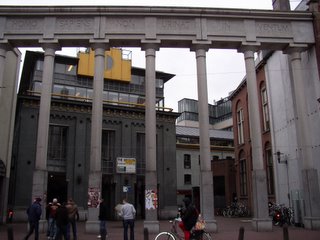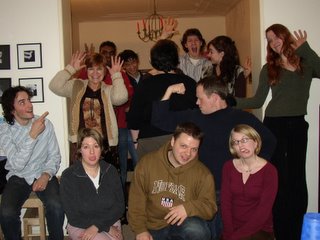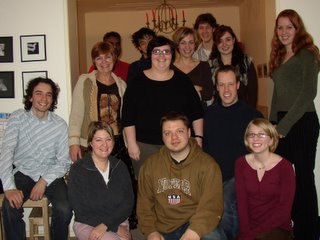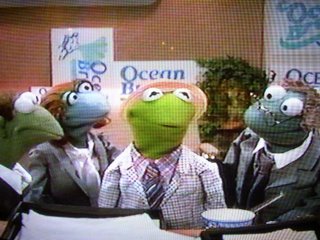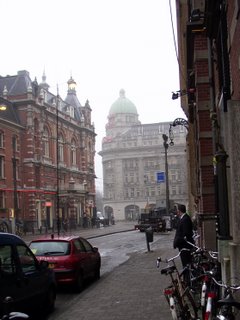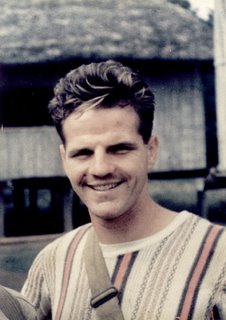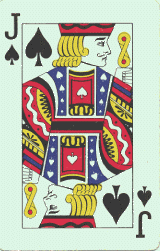
"C'mon Beebes! What are you so afraid of?" The cultural ritual has already begun. An refined mixture of sarcastic humor, good-natured taunting, pittering banter. We're getting ready to play cards.
Lee and I have already dragged the table in from the other room, sorted out the necessary cards from the deck, and thrown down a challenge to our old friends who are also our new neighbors in the city of Amsterdam. But Mark and Jill are checking her e-mail for news on her father's surgery earlier in the day, and well, Lee and I are getting impatient. We cannot contain ourselves from some trash talk. "Come and get it, kids!" and "We're waaaaiiiting!" and other such meaningless drivel... In fact, it's just a few moments before the Beebes are on their way down the stairs to the waiting table.
Lee and I face each other across a small round table, Mark is on my left, Jill is on my right. My partner starts to shuffle the diminuitive deck and, like generals at Appomattox, we discuss the rules of engagement.
"Ace, no face?" Everyone shakes their heads, as if in disbelief that the question has been asked.
"Stick the dealer?" Yes, of course. Any reasonable game has to keep its pace.
"Partner's best?" No. C'mon. We're playing straight-up -- none of these mamsy-pamsy little rules to muddle a perfectly good evening.
We speak a strange vernacular, defined by our culture, our comradery, our contest. Wyatt Earp and his Wild West posse had their Poker. Ivan Ilyich and the Moscow upper middle class had their Bridge. Heathcliff Huxtable and his East Coast urban intellectuals had their Pinochle. And we working-class American Midwesterners -- whether in the flatlands of Bowling Green or reassembled in the lowlands of Amsterdam -- we have our Euchre.
As the first hand is dealt, we commence with our time-honored cultural ritual. Jill knocks on the table to indicate her pass. I breathe a quick "pass" and point to my left. Mark sighs with a hint of frustration, and says "pass" as if he simply has no other choice. And Lee pauses for a moment -- hand poised over the Queen of Hearts for dramatic effect -- before he scoops the card into his hand and begins our game. We maintain casual conversation, while we play.
"So is Marci home with the kids tonight?" Jill asks.
"Yeah," I respond. "That's how it goes with two little ones." We practice economy of words, according to the customs of our people -- an earthy, practical, plain breed of Americans known for industriousness, quiet-contentiousness, stick-to-it-iveness. We Ohioans are not known for our charm, grace, or eloquence -- not naturally given to passionate discourse or thoughtful soliloquies. Our only fanatacism tends to be for our sports. And the competitive nature of Euchre happens to tiptoe the line between social interaction and sports. So we like our Euchre.
"Spades for my partner!" I announce. Of course, I don't know what Lee holds in his hand -- but this is how I've always ordered up Spades. It is one of a thousand rituals of the game that have been committed to unconscious habit. Grumbling about being "four-suited." Groaning upon discovery of the cards that have been "buried" in the "kitty." Hawking each other in constant vigilence against "re-negging." Chiding each other proverbially, "turn down a bower, and you'll lose for an hour." This happens to be the one form of communication where we can speak a private language inintelligible to our Amsterdammer friends (who are typically more fluent in English than a crowd of American high-schoolers).
Lee and I happen to be getting the good cards tonight. Before long, we are up by six. And we pour it on heavy for our old friends who have just recently followed our eastward migration from Ohio to Holland by approximately three years.
"You know, it's tough when you move to a new place," Lee deadpans.
"Yeah," I say. "We've elevated our game to a whole new level here in Amsterdam."
"It'll probably take awhile to catch on," Lee offers in mock reassurance.
"I feel real bad for you guys. My heart is welling up with sorrow for what you're going through right now," I say.
Mark and Jill take their whooping honorably. We end up winning the game 10-1, but our friends are gracious in defeat -- only the minimum amount of whining about bad cards and such. I appreciate them for their manner. Lee and I try not to be too gleeful in victory, but we cannot avoid the release of our satisfaction. And in the end, our satisfaction comes back to bite us. We lose the second game, 10-3.
I ask the obvious question: "So I suppose we should play a rubber match now, huh?"
"Or... we could all go home happy," says Mark. An even split for the night is not a bad idea.
"That works for me," Lee says.
"Yup. Me too," replies Jill.
"Yeah, sure," I say. "I wouldn't mind getting home to bed." It is, after all, eleven o'clock.
As I ride home on my bicycle -- past the Leidseplein, past the lines of gothic youth waiting to get into the Paradiso, past the majestic towers of the Rijksmuseum -- I feel a sense of resonance and realization. Across the cultures, I reconnected with my culture. The Midwest was brought to the middle of Amsterdam, and I communed with my people this evening. The gentle sarcasm, humble self-deprecation, playful competition, practical passivity... I could not wish for more than a game of Euchre with old friends. The feeling of a king in his castle. The reminder that home is where the heart is.
And I'm glad to realize that the King of Hearts is tucked safely away in the hand of my partner, ready to serve as a "stopper" -- maybe even to force a "Euchre" of my worthy opponents.

